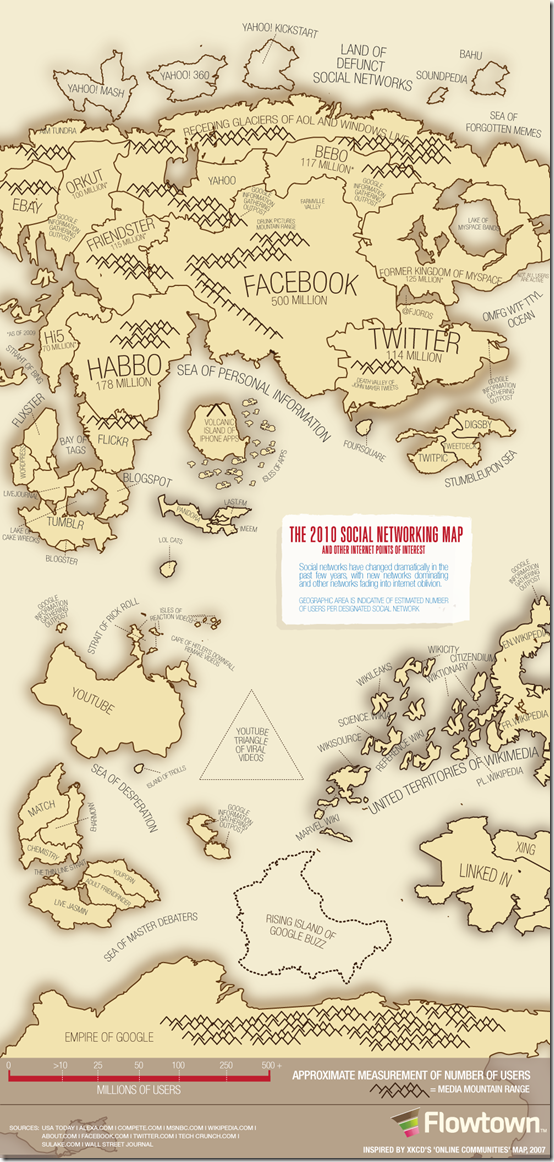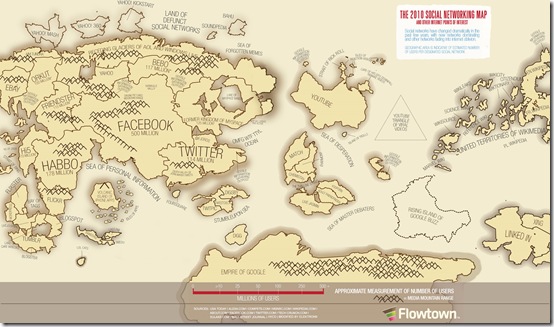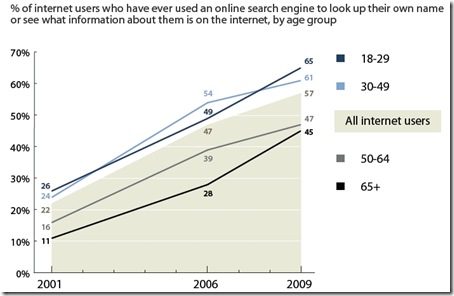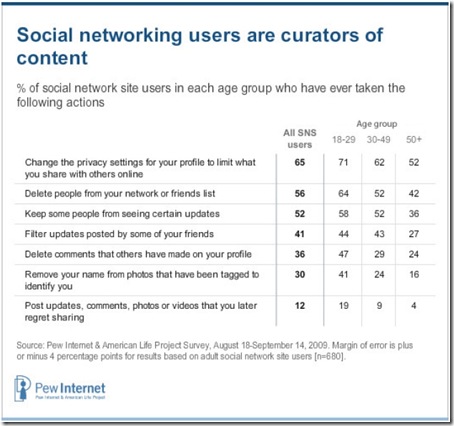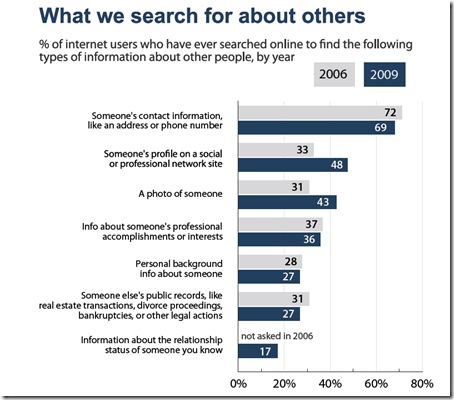Home » web2.0 (Page 3)
Category Archives: web2.0
Initial Thoughts on Facebook Places
 Earlier today Facebook announced the release of their long-rumoured geographic tagging tool, Facebook Places. In a nutshell, Places will allow smartphone-wielding users to ‘check in’ at whatever notable location they happen to be, and share that information with friends on Facebook (who, as per your privacy settings, will either be a very small group or all 500 million+ Facebook users). The history of whose checked in where will become part of the Facebook record for that place, and thus any tagged comments people make in or about those places will become part of, effectively, place history.
Earlier today Facebook announced the release of their long-rumoured geographic tagging tool, Facebook Places. In a nutshell, Places will allow smartphone-wielding users to ‘check in’ at whatever notable location they happen to be, and share that information with friends on Facebook (who, as per your privacy settings, will either be a very small group or all 500 million+ Facebook users). The history of whose checked in where will become part of the Facebook record for that place, and thus any tagged comments people make in or about those places will become part of, effectively, place history.
While similar check-in services like Foursquare already exist, the huge number of Facebook users means that this has the potential to bring place-based social sharing even further into the mainstream. Indeed, at the Places launch, Facebook has already announced partnerships with many place-based services, including Foursquare, Gowalla and Yelp; check-ins on those services can also become check-ins on Facebook Places in the near future.
Facebook’s unique selling point, of course, will be capitalising on the existing social networks people have established. Facebook Places will actually allow people to tag friends, much in the way you can currently tag friends in photos. One iPhone user will be able to tag the all of their relevant Facebook friends as they check-in somewhere. While this is certainly very social, it’s also a huge boon to business and advertisers, and raises a whole new raft of privacy concerns.
For businesses, especially small businesses, Facebook Places has enormous potential. Localised reviews and ratings have been popping up all over the web for years, but the reach of Facebook, and the ease of access, will make social commentary of restaurants, clubs and other businesses easily aggregateable and accessible. Facebook have already indicated that Facebook business pages will be able to integrate the related Facebook Place information. While Facebook themselves aren’t immediately releasing game-based tools with Facebook Places, canny businesses will surely take up this data to reward/encourage customers – as the have with Foursquare – ‘10 Facebook Place check-ins and get a free muffin’ will be with us soon. Of course, an inevitable legal battle is also just around the corner: which will be the first business to sue a Facebook user for a negative comment about that place? The divide between expressing an opinion, and effectively reviewing a location, will certainly blur even further.
With all of this new information sharing come massive privacy questions, and questions which in typically Facebook style they’ve deferred to an opt-out mentality: users will be able to chose, using one of those elusive privacy settings, to either disable other people checking them into places, or they can remove check-ins manually, similar to the way folks can un-tag themselves in unflattering photos. By default, though, it seems everything will be turned on, and users will have to actively seek to disable Facebook Places if they don’t wish Facebook to build a history of where you’ve been. It’s worth noting that the New York Times, The Guardian and Mashable all have articles up citing privacy concerns about Facebook Places, before the service is even a day old. It’ll be interesting to see what problems Facebook encounters with Places, but they’ll no doubt do as they always have: turn it on, let everyone try it out, then slowly deal with whatever complaints and protests arise, knowing full well that 99% of users will never leave Facebook for fear of giving up vital social capital.
Initially, Facebook Places is only available in the US (and thus the official Facebook Places page will show you nothing in Australia today) but it’s sure to land here in the near future. Oh, and no use trying to set you privacy in advance: I’ve checked, and I can’t find a way to pre-emptively disable other people checking me in; I guess I’ll have to remember to do that once the service is activated down under. Update: It’s now possible to opt-out and disable other people checking you in, no matter what country you’re in. If you want to disable other people’s ability to add you to their check-in entirely, then follow these instructions from Valleywag.
Update: While it’s pretty clear that Facebook Places is yet another tool to entice advertisers to Facebook, often seen in direct competition with Google, in a move that really highlights Facebook’s desire to challenge Google, the maps used by Facebook Places will be exclusively powered by Microsoft’s Bing Maps.
Update 2: Facebook Places went live in Australia on 30 September, and it took only hours for the first privacy concerns to arise.
2010 Social Networking Map
A great 2010 update from Flowtown’s Ethan Bloch of the (in)famous XKCD Map of Online Communities.
Update: Or you might prefer your map horizontally …
Wendy NOT 4 Senate
So, in an electioneering Australia political landscape most notable for not being notable, it’s the bigots and racists that seem to stand out, and that seems to be the home territory for Family First senatorial wannabe Wendy Franics who, yesterday on Twitter suggested allowing gay couples to be parents was tantamount to child abuse. The rapid, wide-spread dismay and denouncement of her tweets seems to have shaken Francis, who deleted her tweets, only to discover that people take screenshots of stupid stuff other people say online. Indeed, responses to Francis’ bigotry have become a hot-topic on the #ausvotes hashtag, proving that in an election it’s certainly not true that all publicity is good publicity! In a follow-up interview, Francis has been unable to justify deleting her offensive tweets, but has rather gone on to dig an even deeper hole for herself. Meanwhile, the inevitable parody Fake Wendy Francis tweet account – Wendy2TheSenate – is already making the most of Family First’s predicament (it’s a lot more fun to read than her real Twitter account). It’s also interesting to note how effectively Twitter Lists can be used to protest about someone’s bigotry (screen capture; oh, and that picture/link contains some naughty words!).
As this graph shows, within the #ausvotes tweets on Twitter,Francis’ gaffe certainly got attention, more attention even than her party en masse, but that’s not the attention most politicians are after on the way to an election:
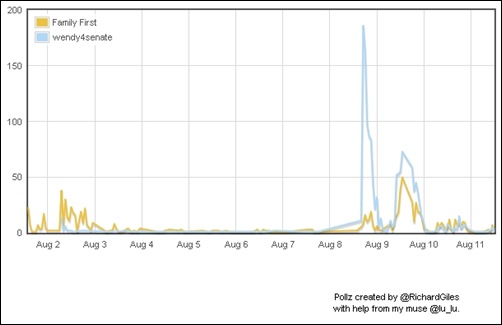
[Graph generated by Pollz.]
Digital Culture Links: August 4th 2010
Links for August 4th 2010 (definitely not endorsed by any version of Andrew Bolt):
- Andrew Bolt discovers Twitter fake. Is cross. [mUmBRELLA] – News Ltd columnist Andrew Bolt has, it would appear, had something of a sense of humour failure over his fake Twitter persona. This morning, Bolt wrote in his Herald Sun blog: “It shouldn’t need saying, but I do not have a Twitter account and the fake one seems to be the work of people whose employer will be very embarrassed to find its staff once more engaging in deceitful slurs. A little warning there. A tearful sorry afterwards will be both too late and insincere, especially from people with their record of sliming.” The fake Andrew Bolt, who has about 5000 followers, does give certain subtle clues on Twitter that he ain’t the real deal. Such as his bio: “Journalist. Blogger. Broadcaster. Climate scientist. Great in bed. This is the Twitter of Andrew Bolt. Follow me you barbarians.” Or messages such as: “Julia Gillard should put together a comittee of common folk to see if they can change the laws of physics. I suspect they can.””
- Andrew Bolt is not happy about @andrewbolt [Peter Black’s Freedom to Differ] – Peter Black looks at the legal side of (fake) Andrew Bolt on Twitter: “…it seems to me that Bolt would at least have an arguable case, that one or more of the tweets constituted a defamatory imputation. Moreoever, they were referrable to Bolt and published. It is also worth noting that cartoons, caricatures, jokes or satire may be defamatory depending upon the context of the publication (see Entienne v Festival City Broadcasters (2001) 79 SASR 19). How a jury would construe these statements, given they take place in the context of a fake Twitter account, is hard to predict. Nonetheless, I do believe that a judge would find that the material is capable of defaming Bolt and that it would then be up to a jury to decide whether the material actually defamed Bolt. So while I think it is highly unlikely Bolt would actually sue for defamation, it is worth remembering that even fake Twitter accounts, while intended for the purpose of satire and humour, may well have legal consequences.”
- Twitter List @andrew__bolt/AndrewBolt – A list of more than 30 ‘Andrew Bolt’ (fake) accounts on Twitter, the majority of which have appeared in the last 24hrs since Andrew Bolt (the man) complained about @andrewbolt (the most popular fake, on twitter).
- SRSLY? SMS Celebrates Its 25th Birthday [The Next Web] – “According to a press release from Sherri Wells, ‘one of the leading SMS messaging experts in the world’, SMS is celebrating 25 years of existence today, making its way from a R&D lab at Vodafone to become a technology that is now present on every single mobile phone currently in existence. Although SMS was developed twenty-five years ago in a collaboration between France and Germany, the first text message was actually sent seven years later on December 3rd, 1992, reading “Happy Christmas”. Since then SMS evolved through various stages, starting as a free service where teens helped popularise the service, before carriers then charged for the service, causing a decline of up to 40% in the process. Back in 2000, the average monthly texts sent per user was a paltry 35, today it’s as high as 357 with 1.5 trillion messages sent annually in the US.”
- Bill Cosby dead rumours dismissed on Twitter [WA Today] – Tweets of my death have been greatly exaggerated! “Television star Bill Cosby has been forced to reassure fans he’s still alive and well after news of his ‘death’ became a top trending topic on Twitter. ‘Bill Cosby died’ remains the fifth highest trending topic on the micro-blogging site this morning. “Emotional friends have called about this misinformation,” the Cosby Show star tweeted in response to the announcement. “To the people behind the foolishness, I’m not sure you see how upsetting this is. “Again, I’m rebuttaling rumours about my demise (sic).” This is the second time this year that Cosby has been pronounced dead by social media.”
- Old Spice Voicemail Generator – Make your own voicemail or answering machine message made up of audio samples from the Old Spice guy’s recent replies. This voicemail is now diamonds! (By Chriswastaken, Area, and Nelson Abalos Jr | Thanks to Reddit)
- YouTube Star to Put His Life in Your Hands for a Year [Mashable] – “Heyo all you megalomaniacs out there — may we introduce yet another way to get your jollies this year: Dan 3.0. Starting today, 20-year-old YouTube sensation Dan Brown is launching a new web show/social experiment in which he will turn control of his life over to you, the viewers, for an entire year. Brown […] is one of those rare dudes whose only gig is video blogging. […] When asked how he thinks this project will affect his day-to-day life, Brown told us: “Basically I’m going to be living my life, doing what my viewers tell me and documenting it. That’s going to be it. Daily life is going to be affected – I don’t know exactly what it means for relationships with friends and relationships with people I know in real life. I guess we’ll find out when we get there.” So as to prevent any catastrophes, Brown has a few ground rules. Viewers can’t ask him to do things like, say, dump his girlfriend, or to do anything illegal or harmful to others. He has also veto power …”
- Google Android phone shipments increase by 886% [BBC News] – There’s a lot more smartphones out there: “Google Android phone shipments increase by 886% Shipments of Google’s Android mobile operating system have rocketed in the last year, figures suggest. Statistics from research firm Canalys suggest that shipments have increased 886% year-on-year from the second quarter of 2009. Apple showed the second largest growth in the smartphone sector with 61% growth in the same period. Overall, the smartphone sector grew by 64% from the second quarter 2009 to the second quarter 2010, the research says.”
Digital Culture Links: July 18th 2010
Links for July 15th 2010 through July 18th 2010:
- As Older Users Join Facebook, Network Grapples With Death [NYTimes.com] – How Facebook does (and doesn’t) deal with death: “For a site the size of Facebook, automation is “key to social media success,” said Josh Bernoff, […] “The way to make this work in cases where machines can’t make decisions is to tap into the members,” he said, pointing to Facebook’s buttons that allow users to flag material they find inappropriate. “One way to automate the ‘Is he dead’ problem is to have a place where people can report it.” That’s just what Facebook does. To memorialize a profile, a family member or friend must fill out a form on the site and provide proof of the death, like a link to an obituary or news article, which a staff member at Facebook will then review. But this option is not well publicized, so many profiles of dead members never are converted to tribute pages. Those people continue to appear on other members’ pages as friend suggestions, or in features like the “reconnect” box …”
- Facebook Breaks All Bit.ly Links, Marks Them as Abusive [Mashable] – For a period of time, all bit.ly links were blocked on Facebook; clicking on them returned a ‘reported as abusive’ page from Facebook. I’m sure this will be resolved relatively quickly, but it does underscore the danger of URL shorteners as platforms (not just Facebook) battle phishing and spam. Blocking a whole domain is overkill, of course, but it’s going to happen and it’s worth asking about the extra burden that one extra (shortened) step brings to the internet at large. (It’s fixed now.)
- New Spice | Study like a scholar, scholar [YouTube] – Definitely my favourite parody of the Old Spice guy so far: “Do you want to be a scholar? Then study at the Harold B. Lee Library. Do your research here, study here, and be a scholar!” I’m on a cart …
- Everything you need to know about the internet [Technology | The Observer] – Nine ‘big picture’ notions about what the internet is and isn’t from John Naughton (Professor of the public understanding of technology at the Open University). Useful as a primer for Web Communications 101.
- The Trouble at Twitter Inc. [Gawker] – Gawker’s rumour-ridden piece suggesting that Evan Williams may be losing the reigns as CEO of Twitter.
- World Vision I Old Spice [YouTube] – Tim Costello from World Vision makes his own Old Spice guy (parody) reply, pitching World Vision as the charity of the future. It’s actually quite funny.
- O’Farrell lays low after Twitter gaffe [ABC News (Australian Broadcasting Corporation)] – “New South Wales Opposition Leader Barry O’Farrell is laying low after posting an embarrassing message this morning on the social networking site Twitter. Believing he was sending a private message to journalist Latika Bourke’s Twitter account, Mr O’Farrell opened up on his thoughts about the delay on candidate selection. […] “Deeply off the record – I think the timetable and struggle to get candidates reflects internal poll – pre and post the ranga,” he tweeted, a reference to Prime Minister Julia Gillard.”
Old Spice 2.0 – Day 2
Continuing from yesterday’s post about the impressive Old Spice replies social media campaign, I just wanted to highlight two more examples since they replies have continued into day two of the campaign. The first, a reply to knitmeapony’s request of an answering machine message shows just how clever the script writers are on these clips: the Old Spice guy carefully delivers a clip with can so easily be remixed into any number of customised answering machine replies, with strategic pauses between audio bites of numbers and phrases, making this a really easy clip to remix! Like so:
Or the equivalent for a man’s man’s answering machine:
The other clip which I really liked was to Isaiah Mustafa’s daughter, Hayley, who wondered why the Old Spice man looks so much like her dad:
It’s worth noting that while this clip is public, it’s unlisted, so not visible on the main YouTube channel; initially, it was only found by those who saw the tweet. Having some clips only available via specific media platforms gives Old Spice reply fans even more reason to join all the Old Spice social media forms!
Meanwhile, Marshall Kirkpatrick over at Read Write Web has a look behind the curtain at How the Old Spice Videos Are Being Made; Kirkpatrick gets a certain amount of access to the production team, so it’s worth having a read. Also, Boing Boing note that there’s already been some ‘competition’ for the Old Spice man, but that’s a little generous.
I do wonder if there will be any more of these clips. There are still some gems in the second day’s replies, but they also seem to be running out of steam here and there, repeating their jokes a bit. Perhaps the Old Spice man needs to rest after a job well done, leaving the tantalizing promise of a repeat performance weeks or months down the track?
Update: It’s done; I must ride my jetski/lion into the sunset …
Old Spice 2.0!
When Old Spice is mentioned, if anything comes to mind at all, it’s … old. And not old in a dignified or wise way. That’s all changed for me today, as I’ve just seen evidence that their current marketing campaign is one of the cleverest commercial use of social media I’ve ever seen (thanks to a post from mUmbrella). The story begins with this well-produced, amusing advertisement for Old Spice:
Apparently it won some awards and so forth, but it’s still just a normal tv spot.
Then, today, things started to get interesting on the Old Spice YouTube channel (with links on Twitter, Facebook and even Reddit) as Isaiah Mustafa, in his Old Spice role, started replying to comments from people online. First off, a big media nod to Ellen DeGeneres, and it seemed like there might be a series of carefully scripted replies to recognisable celebrities and media platforms (all amplifying the Old Space brand, of course). But then the Old Spice marketers did something really clever: the replies in the videos shifted aim, towards non-celebrity, ‘ordinary’ internet users who’ve made comments somewhere (YouTube, Facebook, Reddit, Twitter, etc) about the Old Spice ads. Suddenly, that netherworld of social media comments, which so often feels like screaming into the wind, brought a deluge of replies from the Old Spice guy. Over one hundred Old Spice replies were uploaded in 24 hours, the vast majority of which are in reply to comments made today. Just as impressive, the writing team have obviously enjoyed their energy drinks, because the scripts were hilarious, endearing, ironic and certainly every single reply is worth watching.
No doubt the most notable Old Spice reply will be one done in reply to jsbeals’s request to pass on his marriage proposal; the story ends well as she apparently said yes! However, what really impressed me is that the masculinity of the Old Spice ads, while driving the marketing pitch, is also deeply ironic (which rather suits the a brand of this vintage), poking particular fun at its own notion of ‘being a man’:
The Old Spice replies are also littered with internet-driven humour, with a particular take on the age old pirates vs ninjas debate, a good poke at stupid YouTube handles in the form of a decent robot joke, an hilarious jab (and brave) jab at 4chan, /b/, and anonymous, and lots of other references to please us all. My favourite quirky video, though, was this seemingly innocuous reply to a tweet that came from Isaiah Mustafa …
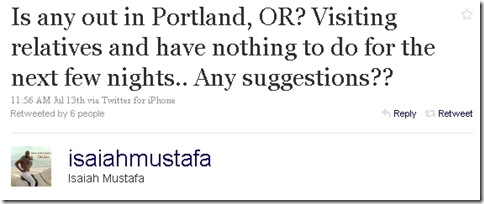
and got this reply:
The funny thing, of course, is that Isaiah Mustafa is the guy in the ads, in the bathroom … in a towel (and I guess we know what’s under that towel now: the iPhone from which he’s tweeting to his own account!). Indeed, Mustafa has been a great sport, going along with some very quirky scripts that he’s obviously delivered very quickly. When the boundary between a game, a conversation and an advertising campaign becomes so thin, it’s everyone who wins. Old Spice 2.0 has certainly made me laugh today and I’m sure I’ll be reading about the Old Spice replies in pretty much every news media I go near tomorrow!
World Map of Social Networks (June 2010)
Last year Vincenzo Cosenza, produced a very useful visualisation highlighting the dominant social networking service by country; this month he has re-done the figures (current June 2010) and the results, while not surprising, really hit home how big Facebook has become; it’s the dominant network in most countries, with a few exceptions like QQ in China and Orkut in Brazil.
(Click to interact with the map.)
Also of interest in this table, showing the three most popular social networking services in a number of countries. Here in Australia, Facebook dominates, with Twitter in second place, with MySpace hanging on in third; it’s interesting that, despite the hype and media visibility, MySpace still remains number two in the US, while LinkedIN ranks higher in the UK and Canada.
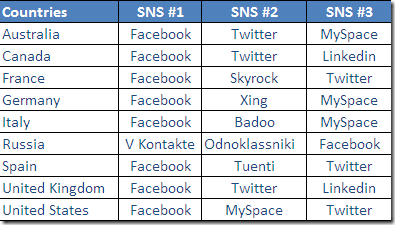
Reputation Management and Social Media
Today the Pew Research Centre’s Internet and American Life Project released their report Reputation Management and Social Media (2010) which is based on research undertaken late 2009. There is a great deal of important and topical information in the survey, with the US results likely to be slightly higher but certainly comparable to trends in Australia. I want to really draw attention to the way that younger adults are using social media according to this report, using three of Pew’s graphs to talk about their findings.
The first graph indicates how many internet users search for their own name online:
This result is particularly interesting for two reasons: firstly, it shows that across the board, interest in our own web presences has increased dramatically across the last decade; and secondly, it highlights that younger adults (those 18-29) appear to be the most concerned with their online reputation. As danah boyd celebrated earlier today, this result really undermines the cultural myth that younger people are the least interested with online privacy. Obviously this survey excludes people under-18, but it’s fair to assume that part of the process of growing up these days includes becoming sensitised to the importance of being aware of our web presence.
Similarly, the Pew report also highlights the face that younger people are the most active in controlling their presence online, insomuch as they are most likely to have changed their privacy settings on social networks, they are the most likely to untag a photo of themselves, and so forth:
Here we see that younger people are also the most conscious of shaping their web presence, by editing who can see what they share online, and which elements of the digital artefacts linked to them remain visible, and remain linked to their names.
The last Pew graph shows how much information people are seeking about others online:
Everything from contact details to photos are being sought online, which similarly highlights how important it is that everyone be aware of what their web presence really ‘says’ about them.
Since I teach in the Internet Studies department here at Curtin, it’s hardly a surprise that all of this information is vital to consider when we design the learning experiences our students encounter. In the first-year unit Web Communications 101, the notion of web presence is our central organising theme. However, one of the distinctions we make, which Pew does not, is the difference between digital traces we leave purposefully, and maintain control over, versus those we don’t. In Web Comms 101, as Pew does, we talk about footprints, but we also talk about digital shadows, those bits of digital media that are somehow attached to our names, or chosen identities, which we have minimal, if any, control over. Given how much people search for each other, and how much thought is going into how we appear online for the average internet user, it’s probably how we address and deal with those shadows which will be one of the most important topics to seriously consider in the coming years.
Facebook faces a Diaspora

Ever since Facebook deployed their ‘instant personalisation’ tools (ie putting a ‘Like’ button on pretty much everything online), the backlash against the resulting privacy losses has been loud and clear; Facebook look to be going into PR damage control, as Read Write Web notes, they’re circling the wagons. Despite providing Elliot Schrage, vice president for public policy at Facebook, a platform to directly engage with public concerns about Facebook earlier this week, the New York Times has seemingly turned on the social networking goliath today. First off the ranks, their article ‘Price of Facebook Privacy? Start Clicking’ does a really good job at showing the huge problems with Facebook’s privacy settings, from the privacy policies massive (and growing) length, to a brilliant (and dumbfounding) infographic which illustrates the more than 170 privacy options users need to navigate and understand to have any ownership of your privacy on Facebook.
At the same time, the New York Times are asking ‘Is There Life After Facebook?’, in which they talk about the problems of social media evangelists who feel Facebook has crossed a line, and want to delete their own profiles. Yet the strongest critique of Facebook’s recent changes comes from the showcase ‘Four Nerds and a Cry to Arms Against Facebook’ which introduces the founders of Diaspora, a yet-to-be-released social network which will attempt to replicate the social elements of Facebook while providing clear privacy controls using an open-source framework. While it’s far too early to judge whether Diaspora will be successful, the fact that they’ve already raised more than $US60,000 via Kickstarter (with pledges from more than 1700 people!) shows that a lot of people are looking for a change.
At first glance, Diaspora’s aims might seem a little utopian (and thus technically quite hard to achieve):
Diaspora aims to be a distributed network, where totally separate computers connect to each other directly, will let us connect without surrendering our privacy. We call these computers ‘seeds’. A seed is owned by you, hosted by you, or on a rented server. Once it has been set up, the seed will aggregate all of your information: your facebook profile, tweets, anything. We are designing an easily extendable plugin framework for Diaspora, so that whenever newfangled content gets invented, it will be automagically integrated into every seed.
Now that you have your information in your seed, it will connect to every service you used to have for you. For example, your seed will keep pulling tweets and you will still be able to see your Facebook newsfeed. In fact, Diaspora will make those services better! Upload an image to Flickr and your seed can automatically generate a tweet from the caption and link. Social networking will just get better when you have control over your data.
A seed will not just be all your existing networks put together, though. Decentralizing lets us reconstruct our “social graphs” so that they belong to us. Our real social lives do not have central managers, and our virtual lives do not need them. Friend another seed and the two of you can synchronize over a direct and secure connection instead of through a superfluous hub. Encryption (privacy nerds: we’re using GPG) will ensure that no matter what kind of content is being transferred, you can share privately. Eventually, today’s hubs could be almost entirely replaced by a decentralized network of truly personal websites.
If Diaspora tells us anything, it’s that Facebook’s dominance is under threat, and the next Mark Zuckerberg (or Zuckerbergs in Diaspora’s case) might start with firmer principles in place. Privacy is one of the great bugbears of social media, we want to share, but we want at least a modicum of control over that. Facebook might roll back some of its worst ‘personalisation’ changes of recent weeks, but even then, many people have lost the will to trust Facebook; that loss might be their most expensive mistake ever.

